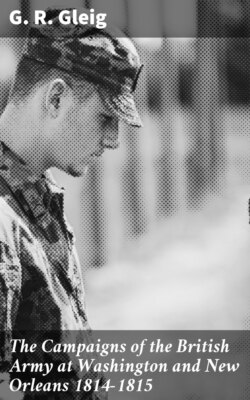Читать книгу The Campaigns of the British Army at Washington and New Orleans 1814-1815 - G. R. Gleig - Страница 10
На сайте Литреса книга снята с продажи.
CHAPTER III. LES LANDES
ОглавлениеTHE dawn was just beginning to appear, when the bugles sounded, and the tents were struck. For the first few leagues, our route to-day resembled that of yesterday, in almost every particular. There was the same appearance of peaceful quiet, the same delightful intermingling of woods, corn-fields, vineyards, and pasture; but we had not proceeded far, when a marked difference was perceptible; every step we trod, the soil became more and more sandy, the cultivation less frequent, and the wood more abundant, till at last we found ourselves marching through the heart of an immense forest of pines. We had diverged, it appeared, from the main road, which carries the traveller through a rich and open country, and were pursuing another through the middle of those deserts and savannahs which lie towards the coast; a district known by the name of les Landes. There was something, if not beautiful, at least new and striking in the scenery now around us. Wherever the eye turned, it was met by one wide waste of gloomy pine-trees; diversified, here and there, by the unexpected appearance of a modest hamlet, which looked as if it were the abode of some newly arrived settlers in a country hitherto devoid of human habitations.
Were I to continue the detail of a long march through these barren regions, I should soon fatigue, without amusing my reader: I shall, therefore, content myself with observing, that day after day the same dreary prospect presented itself, varied by the occasional occurrence of huge uncultivated plains, which apparently chequer the forest, at certain intervals, with spots of stunted and unprofitable pasturage; upon these there were usually flocks of sheep grazing, in the mode of watching which, the peasants fully evinced the truth of the old proverb, that necessity is the mother of invention. I do not know whether the practice to which I allude be generally known, but as it struck me as very remarkable, I shall offer no apology for relating it.
The whole of this district, as well where it is wooded, as where it is bare, is perfectly flat, containing scarcely a knoll or eminence any sort, as far as the eye can reach. In addition to this, the vast plains where the sheep are fed, many of which extend two or three leagues in every direction, produce not so much as a fir-tree, by climbing which, a man might see to any of its extremities: and the consequence is, that the shepherds are constantly in danger of losing their sheep, as one loses sight of a vessel at sea, in the distance. To remedy this evil, they have fallen upon a plan not more simple than ingenious; they all walk on stilts, exactly similar to those with which our school-boys amuse themselves; the only difference lying here, that whereas the school-boys' stilts are with us seldom raised above ten or twelve inches from the ground, those of the French peasants are elevated to the height of six or eight feet.
When we first caught a glimpse of these figures, it was in the dusk of the morning, and for awhile we were willing to persuade ourselves that the haze had deceived us, by seeming to enlarge bodies beyond their real dimensions. But when we looked at the trees, we saw them in their own proper size, nor could we suppose that the atmosphere would have an effect upon one object, which it had not upon another; yet there appeared to be no other way of accounting for the phenomenon, unless indeed this wild country were the parent of a race of giants, for the men whom we saw resembled moving towers rather than mortals. I need not observe that our astonishment was very great; nor, in was it much diminished when, on a nearer approach, we discovered the truth, and witnessed the agility with which they moved, and the ease with which, aided by the poles which each carried in his hand, they would stoop to the ground, pick up the article, and stand upright again. But if we admired the skill of one or two individuals, our admiration rose to a still higher pitch when we saw crowds of them together, all equally skilful; till they informed us that the thing was not an amusement, but universally practised for the purpose I have stated.
Besides this, I know of nothing in the customs of this isolated people at all worthy of notice, unless, indeed, it be their method of supplying themselves with lights. Being completely cut off from the rest of the world, it is not in their power, except when once or twice a-year they travel to the nearest towns with their wool, to purchase candles; and as they have no notion how these can be made, they substitute in their room a lamp, fed with the turpentine extracted from the fir-trees. The whole process is simple and primitive: to obtain the turpentine they out a hole in the tree, and fasten a dish in it to catch the sap as it oozes through; and as soon as the dish is filled, they put a wick of cotton into the midst of the liquor, and burn it as we do a lamp. The light is not indeed of the most brilliant nature, but it is at least better than none; and as they have fir-trees in abundance within their reach, there is no danger of their oil being quickly exhausted.
